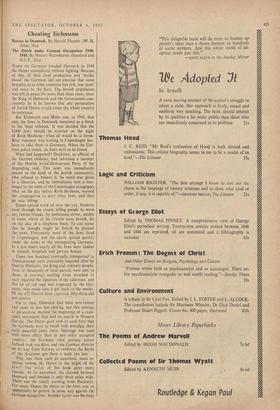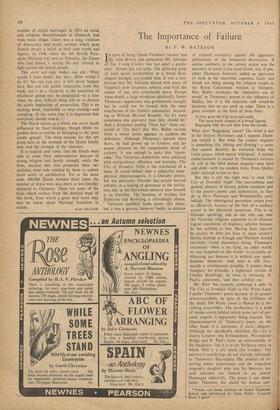Cheating Eichmann
WHEN the Germans invaded Denmark in 1940 the Danes surrendered without fighting. Because of this, of their food production and `nordic blood' the Germans did not exercise that same brutality as in other countries less rich, less 'pure' and more to the East. The Jewish population was left in peace for more than three years, since the King of Denmark and the Government con- sistently let it be known that any persecution of Jewish Danes would rouse the whole country to resistance.
But Eichmann and Hitler saw, in 1943, that only the Jews in Denmark remained as a block to the 'final solution.' It was decided that the 8,000 Jews should be arrested on the night of Rosh Hoshana—when all would be at home. Boat transport was waiting in Copenhagen har- bour to take them to Germany. When the Ger- man police struck, no Jews were to be found.
What had happened? Duckwitz, an official of the German embassy, had informed a member of the Danish Social-Democratic Party of the impending raid. This news was immediately passed to the head of the Jewish community, Who refused to believe it. So word was given to a librarian, and he immediately sent a mes- senger to the rabbi of the Copenhagen synagogue, who, on the day before Rosh Hoshana, warned the congregation to alert other Jews, and then go into hiding.
Danes spread word all over the city. Students went through the streets telling people to warn any Jewish friends. An ambulance driver, unable to know which of his friends were Jewish, hit on the idea of a telephone book. To any name that he thought might be Jewish he phoned the news. Fortunately most of the Jews lived in Copenhagen, and the alarm spread quickly under the noses of the unsuspecting Germans. In a few hours nearly all the Jews were hidden Hi schools, hospitals and private houses.
Those few hundred eventually transported to Theriesenstadt were constantly inquired after by Danish Ministers, the King and ordinary people. Tens of thousands of food parcels were sent to them. A two-way mailing form attached to each required the signature of the addressee, and this bit of red tape was respected by the Ger- mans, who made sure it got back to the sender. Of the 472 Danish Jews captured, fifty-three did not survive.
Up to then, Denmark had been non-violent and more or less law-abiding, but this attempt at persecution marked the beginning of a resis- tance movement that had no match in Western Europe. The Danes gave vent to such fury that the Germans. were to recall with nostalgia their early peaceful years there. Sabotage was used With more effect than in any other occupied Country: the five-hour train journey across Jutland took ten days, and one German division " 'on its way from Norway to reinforce the Battle of the Ardennes got there a week too late.
Why was there such an automatic mass re- sponse among the Danes to the plight of the Jews? The writer of this book gives many reasons. At its narrowest, the channel between Denmark and Sweden is only three miles wide. There was the timely warning from Duckwitz. For many Danes the threat to the Jews was an oPPortunity to protest in some way against the German occupation. Another factor was the large
number of mixed marriages. In 1814 all racial and religious discrimination in Denmark had been made illegal. There was a long tradition of democracy and social . services which gave Danish people a belief in their own worth and dignity. In 1946, when the 6th British Para- chute Division was sent to Palestine, the Danes who had joined it during the war refused to fight against the Jewish people.
This story not only makes one ask: What would I have done? but also: How would I do it? No one can say; it will never happen here. But one can gather inspiration from this book, use it as a blueprint in the assistance of whichever group may be persecuted—at a time when the most difficult thing will be to discern the subtle beginnings of persecution. This is an exciting book, impossible to stop reading—and rereading. At the same time it is important that everybody should read it.
The Dutch nation as a whole was never much influenced by Nazi ideology, though Hitler re- garded them as worthy of belonging to the 'pure nordic groups.' The main reasons for this are given here as the strength of the Dutch family unit, and the strength of the churches.
It is tragical and ironic that the Dutch were able to resist Nazi indoctrination because of strong religion and family strength, while the Jews, because they also possessed these two qualities, were only enabled by them to submit more easily to annihilation. Yet at the same time, 400,000 Dutch workers (four times the number of Jews) were also more or less forcibly deported to Germany. These are some of the facts which surface from the detailed mass of this book, from which a great deal more may also be learnt about National Socialism in











































 Previous page
Previous page